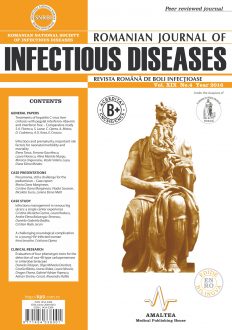SELECT ISSUE

Indexed

| |

|
|
|
| |
|
|
|

|
|
|
|
|
|
| |
|
|
HIGHLIGHTS
National Awards “Science and Research”
NEW! RJID has announced the annually National Award for "Science and Research" for the best scientific articles published throughout the year in the official journal.
Read the Recommendations for the Conduct, Reporting, Editing, and Publication of Scholarly work in Medical Journals.
The published medical research literature is a global public good. Medical journal editors have a social responsibility to promote global health by publishing, whenever possible, research that furthers health worldwide.
INFECTIONS AND PREMATURITY, IMPORTANT RISK FACTORS FOR NEONATAL MORBIDITY AND MORTALITY
Elena Tarca, Simona Gavrilescu, Laura Florescu, Alina Mariela Murgu, Monica Ungureanu, Vasile Valeriu Lupu and Dana Elena Mindru
ABSTRACT
Infant mortality is a major problem in developing countries and, unfortunately, this is the case of our country as well, given that Romania ranks first in the European Union in this respect, with an infant mortality rate of 9 ‰, compared to an average of roughly 4 ‰. Worldwide, over 15 million babies are born prematurely each year and, out of these, more than a million die due to prematurity and infections, which are the main risk factors for neonatal mortality. The risk of infection is several times higher in preterm newborns than in full-term newborns – about 80% of neonatal infections occur in premature infants. A significant proportion of the survivors of prematurity will have important neurological sequelae because of neonatal infections as well as of intracerebral bleeding or hypoxia at birth. Continuing medical education in both the general population and the medical sector is crucial in preventing premature births and neonatal infections and, consequently, in decreasing infant morbidity and mortality rates in our country.
Keywords: neonatal infections, prematurity, morbidity, infant mortality
Full text | PDF
